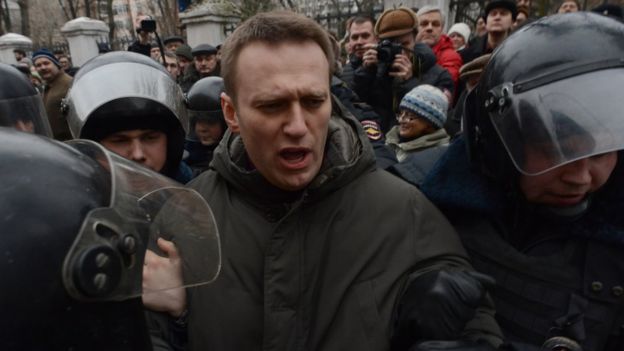Disposing of a Nuisance Provocateur
"I used to have a nightmare many times that I wake up from someone calling me and saying, Alexey was killed or something very bad happened to him. I had this nightmare at least 10 times in my life. I was terrified. Of course, emotionally, it was a very dramatic blow. So it took me several hours to concentrate." "Based on the information I have at this point of time, I strongly believe it's either the state or part of the state. So as of now, we don't have a proof that Putin ordered it. So it might be some of the government agencies. But the level of organization, the poisons that they used. It's not something you can buy in a pharmacy, in a drugstore on the next corner." "So when we discussed it [giving Navalny a higher profile as a Putin critic], our thought was the only possible protection... is maximum publicity. So the greater the number of our supporters, the greater his approval ratings, the larger the risks the Kremlin would be taking trying to kill him." "It was an attempt to kill, not to scare him off." Leonid Volkov, Alexei Navalny's chief of staff
 |
| Alexey Navalny's national organization had launched a campaign promoting tactical voting in Russia |
The latest report from attending physicians at the Berlin Charite Hospital who took over care of Vladimir Putin's chief critic is that the man in a coma who was poisoned a week ago during a trip from Siberia to Moscow may be starting his recovery, though he is still in a coma. His condition is stable and hopes are that a full recovery will be possible, though there could be some lingering neurological effects. For a country that has distinguished itself by silencing critics of Russia's president and the Kremlin with various types of poison, their track record in success is none too impressive.
In various poisonings, half have failed to complete their purpose, while half have succeeded. Fortunately for Mr. Navalny and those close to him, he will survive the attempt on his life. Russians are nothing but clumsy in administering poisons to those whose presence is dreadfully inconvenient in a brutal autocracy which will not brook dissent, taking to covert methods to silence detractors. Other methods, like shooting people as they emerge from their homes, have been more lethally successful.
Soviet scientists have been diligent in developing new nerve agents, particularly a group they call Novichok, a lethal cocktail that acts as a cholinesterase inhibitor that blocks an enzyme required by the nervous system to function. Communication between nerves and muscles are disrupted by the poison -- one that the Organisation for the Prohibition of Chemical Weapons added to their list of banned chemical toxins after Britain accused Russian agents of its use to poison a former Russian intelligence operative and his daughter in 2017.
 |
| Mr Navalny has been detained several times in recent years. AFP |
According to Charite Hospital spokespeople, Alexei Navalny was poisoned but they have not yet been able to clarify what precisely the substance was, though all indications point to a cholinesterase inhabitor, according to preliminary results from several laboratories. Inhaling, ingesting or eye or skin contact with the chemical can be extremely dangerous. Cholinesterase inhibitors have been used as chemical weapons, as pesticides, even as medicine in carefully prescribed doses, for Alzheimer's disease. The chemicals neutralize insects' nervous systems when used as pesticides.
Novichok and Sarin are in a subgroup as nerve agents, far more potent than the pesticides. Cholinesterase is an enzyme critical to the nervous system to regulate basic function of the body, such as heart and lungs. Chemicals blocking the enzyme can result in multi-system flare-ups, seizures, paralysis and even death from respiratory failure.
Syrian President Bashar al-Assad used Sarin in a number of deadly chemical weapons attacks in 2017 against Sunni Syrians. The chemical disrupts gland function and muscles which can lead to symptoms such as headache, blurred vision and breathing difficulties, while heavy exposure can be fatal -- beginning with loss of consciousness, paralysis, convulsions and respiratory failure. Mr. Navalny is being given atropine, a medicine to treat some forms of nerve agent and pesticide poisoning.
 |
| German army medics transport a stretcher carrying Alexey Navalny at Berlin's Charite hospital. |
Labels: Critics, Germany, Medical Facilities, Vladimir Putin

<< Home